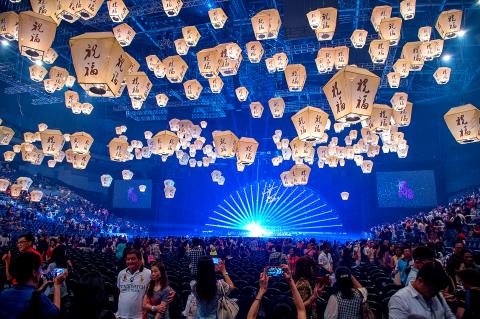“Touring beautiful Taiwan” is what pop diva Jody Chiang (江蕙) said she plans to do following her retirement from the stage.
Chiang wrapped up her 44-year career on Sunday evening with the final show in a 25-concert farewell tour that was marked by copious amounts of tears onstage and in the audience.
“The microphone in my hand was my toy when I was a child. It is the most valuable thing in my life, but after tonight it no longer belongs to me,” the 54-year-old singer said at the Kaohsiung Arena.

Photo: CNA
“There have been hardships, but also people who helped me along the way,” she said, thanking those who mentored her throughout her career.
“I believe that my parents would have been pleased to see the amount of love I received from everyone. God gave me this voice and made me the luckiest person in the world,” Chiang said before breaking down in tears.
Chiang announced on Jan. 2 that she was going to retire after staging a 16-concert farewell tour.

Photo: CNA
There was such a buying frenzy when the three-day window for ticket sales opened that fans overwhelmed the official ticketing site and convenience store ticketing kiosks, drawing widespread complaints. Chiang later announced she would add nine concerts to the tour to cope with the demand.
Her farewell tour began with a concert at the Taipei Arena on July 25.
To symbolize the end of her career, at the end of the concert on Sunday, Chiang placed one of her favorite microphones in a embellished glass casket, locked with box with a key and threw the key out into the audience.

Photo: Chang Chung-i, Taipei Times
About 10,000 keys then showered the stage from the arena’s rooftop.
In a recent interview with the Liberty Times (the Taipei Times’ sister newspaper), Chiang, when asked how she fared over the 51-day span of the concerts, said it was the most confusing and tumultuous period of her career.
She said that when she made the decision to retire, it was simply to give herself a calm, quiet life, but preparing for the tour was so stressful that it left her often unable to sleep well or eat properly for most of the year.
“I did not expect my decision to have such impact,” Chiang said, referring to many fans who said their lives now felt off-kilter in the wake of her decision to retire.
The number of elderly people who made their first visit to the Taipei Arena to attend one of her farewell concerts, many of them in wheelchairs pushed by their children, had deeply moved her, Chiang said, adding that the images were burned into her memory.
“Seeing those images, I was disturbed and felt it would be hard to let go,” Chiang said, adding that she began to wonder if her decision to retire from the stage might have been too selfish.
The continuous entreaties by fans to keep singing made her feel even guiltier, she said, adding that she often could not sleep after the concerts, wondering if she had made the right decision in retiring.
However, words are like water, which cannot be taken back once thrown out, she said.
Born in 1961, Chiang began her singing career at the age of 10 by entertaining patrons at bars to supplement the earnings of her father and mother, a budaixi (布袋戲, glove theater) puppet maker and a food vendor respectively.
She released close to 60 albums and more than 800 songs, and is often credited for championing Hoklo (also known as Taiwanese) songs at a time when Mandarin pop music was the mainstream on the airwaves.
Asked what she intended to do in retirement, Chiang said that while the question had bothered her fans, it was one that she kept asking as well.
Given that 54 is a fairly young to retire, she has plenty of years ahead of her, so she initially thought about doing charity work, perhaps using some of the money from her farewell concerts to establish a public welfare fund, Chiang said.
However, she learned that establishing such a fund is complicated and time-consuming and that she would need additional funding for long-term projects, she said.
So for now she has volunteered to be a “lifetime spokesperson” for the Pxmart welfare foundation, Chiang said.
She said that as a celebrity, she was in the habit of staying at home and being extra careful whenever she left, but now that her career is ending she could go back to being just “a common person named Chiang Hui.”
Chiang said she planned to rest, and then travel around Taiwan.
Additional reporting by CNA

A preclearance service to facilitate entry for people traveling to select airports in Japan would be available from Thursday next week to Feb. 25 at Taiwan Taoyuan International Airport, Taoyuan International Airport Corp (TIAC) said on Tuesday. The service was first made available to Taiwanese travelers throughout the winter vacation of 2024 and during the Lunar New Year holiday. In addition to flights to the Japanese cities of Hakodate, Asahikawa, Akita, Sendai, Niigata, Okayama, Takamatsu, Kumamoto and Kagoshima, the service would be available to travelers to Kobe and Oita. The service can be accessed by passengers of 15 flight routes operated by

GIVE AND TAKE: Blood demand continues to rise each year, while fewer young donors are available due to the nation’s falling birthrate, a doctor said Blood donors can redeem points earned from donations to obtain limited edition Formosan black bear travel mugs, the Kaohsiung Blood Center said yesterday, as it announced a goal of stocking 20,000 units of blood prior to the Lunar New Year. The last month of the lunar year is National Blood Donation Month, when local centers seek to stockpile blood for use during the Lunar New Year holiday. The blood demand in southern Taiwan — including Tainan and Kaohsiung, as well as Chiayi, Pingtung, Penghu and Taitung counties — is about 2,000 units per day, the center said. The donation campaign aims to boost

ENHANCING EFFICIENCY: The apron can accommodate 16 airplanes overnight at Taoyuan airport while work on the third runway continues, the transport minister said A new temporary overnight parking apron at Taiwan Taoyuan International Airport is to start operating on Friday next week to boost operational efficiency while the third runway is being constructed, the Ministry of Transportation and Communications said yesterday. The apron — one of the crucial projects in the construction of the third runway — can accommodate 16 aircraft overnight at the nation’s largest international airport, Minister of Transportation and Communications Chen Shih-kai (陳世凱) told reporters while inspecting the new facility yesterday morning. Aside from providing the airport operator with greater flexibility in aircraft parking during the third runway construction,

American climber Alex Honnold is to attempt a free climb of Taipei 101 today at 9am, with traffic closures around the skyscraper. To accommodate the climb attempt and filming, the Taipei Department of Transportation said traffic controls would be enforced around the Taipei 101 area. If weather conditions delay the climb, the restrictions would be pushed back to tomorrow. Traffic controls would be in place today from 7am to 11am around the Taipei 101 area, the department said. Songzhi Road would be fully closed in both directions between Songlian Road and Xinyi Road Sec 5, it said, adding that bidirectional traffic controls would